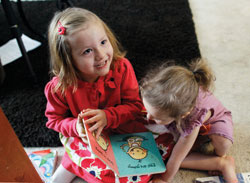For young people, transgender life means stress and confusion over restrooms, sports and harassment

The sibling of three sisters and one brother, Coy Mathis plays at home early this year. Photo by Brennan Linsley/AP/Corbis.
Coy Mathis, 7, was born male. But as a toddler Coy chose items traditionally associated with girls, like tutus and swimsuits featuring the cartoon character Dora the Explorer.
When Coy started to talk, the child said she saw herself as a girl. Kathryn and Jeremy Mathis enrolled their child in kindergarten as a male, but by November Coy became depressed when people referred to her as a boy. It interfered with the child’s learning, according to an administrative ruling.
“Not even my teacher knows I’m a girl,” Coy reportedly told her parents after an educator at a Fountain, Colo., school made the child join the boys’ line in music class. A therapist diagnosed Coy with gender dysphoria, the clinical term for those who are discontent with their birth sex.
Even children as young as Coy may know they are transgender, says Coy’s lawyer, Michael D. Silverman, executive director of the Transgender Legal Defense & Education Fund.
“It’s body image,” says Silverman of New York City. “They know, and often will ask the question: ‘Why does my body look like this—and not like that?’”
Coy’s parents decided that their child should be treated as a girl everywhere, including school. Initially, the school was “really fantastic” about supporting the Mathis family’s decision, Coy’s parents said in a February civil rights filing with the Colorado Civil Rights Division.
But that changed in first grade, when the Fountain-Fort Carson School District (near Colorado Springs) and its lawyer decided that Coy could no longer use the girls’ restroom, according to the family’s filing. Instead, the district decided Coy should use the boys’ restroom or single-user restrooms in the health office and the faculty area.
The district’s reasoning, the filing states, was the concern that as Coy got older other students might be uncomfortable sharing the girls’ restroom with a person who was born male. Also, the agency thought that banning Coy from the girls’ restroom would lessen chances of harassment or bullying.
The Civil Rights Division filing alleges that the school district discriminated against Coy based on the child’s female sex and transgender sexual orientation. And the filing notes that the government recognizes the child’s sex as female on her U.S. passport and state-issued ID. For both, letters from her doctor were required, with him stating that based on his care of Coy, his medical opinion is that her gender is female.
Click here to read the rest of “A gender change at a tender age” from the October issue of the ABA Journal.



